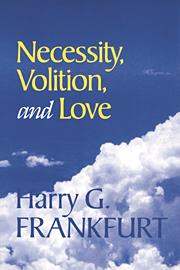Book contents
- Frontmatter
- Contents
- Preface
- Sources
- 1 The Logic of Omnipotence
- 2 Descartes's Discussion of His Existence in the Second Meditation
- 3 Descartes on the Creation of the Eternal Truths
- 4 Two Motivations for Rationalism: Descartes and Spinoza
- 5 Continuous Creation, Ontological Inertia, and the Discontinuity of Time
- 6 Concerning the Freedom and Limits of the Will
- 7 On the Usefulness of Final Ends
- 8 The Faintest Passion
- 9 On the Necessity of Ideals
- 10 On God's Creation
- 11 Autonomy, Necessity, and Love
- 12 An Alleged Asymmetry between Actions and Omissions
- 13 Equality and Respect
- 14 On Caring
4 - Two Motivations for Rationalism: Descartes and Spinoza
Published online by Cambridge University Press: 15 December 2009
- Frontmatter
- Contents
- Preface
- Sources
- 1 The Logic of Omnipotence
- 2 Descartes's Discussion of His Existence in the Second Meditation
- 3 Descartes on the Creation of the Eternal Truths
- 4 Two Motivations for Rationalism: Descartes and Spinoza
- 5 Continuous Creation, Ontological Inertia, and the Discontinuity of Time
- 6 Concerning the Freedom and Limits of the Will
- 7 On the Usefulness of Final Ends
- 8 The Faintest Passion
- 9 On the Necessity of Ideals
- 10 On God's Creation
- 11 Autonomy, Necessity, and Love
- 12 An Alleged Asymmetry between Actions and Omissions
- 13 Equality and Respect
- 14 On Caring
Summary
This essay deals with certain relatively neglected features of the theories of knowledge of Descartes and Spinoza. My aim is not to criticize or to evaluate the views of these philosophers, but to bring out certain parallels and contrasts in the motives which guided their epistemological preoccupations. In the case of Descartes, the pertinent materials appear almost exclusively in his letters. Even though they hardly figure at all in his systematic philosophical and scientific writings, they are highly theoretical and unmistakably germane to his central doctrines. With respect to Spinoza, the situation is somewhat the reverse. While the considerations in question appear in one of his major philosophical treatises, they are of a quite concrete and indeed personal nature. It is customary to classify both Descartes and Spinoza as rationalists, although the differences between them are far from peripheral or insignificant. So far as concerns the underlying motivations of their inquiries, the divergence between them is particularly sharp and unequivocal.
What they did share was an ambition to construct a body of philosophical and scientific knowledge grounded in absolutely certain fundamental principles. Neither was willing to assent to any proposition whose acceptability could not be thoroughly guaranteed by a rigorous demonstration from these principles. Nothing is more characteristic of Descartes and Spinoza than the importance ascribed to order and to unshakable conviction: that is, to starting with the most indubitable beliefs, and to proceeding by carefully planned and fully justified steps to develop an unequivocally reliable understanding of everything within the scope of human intelligence.
- Type
- Chapter
- Information
- Necessity, Volition, and Love , pp. 42 - 54Publisher: Cambridge University PressPrint publication year: 1998



